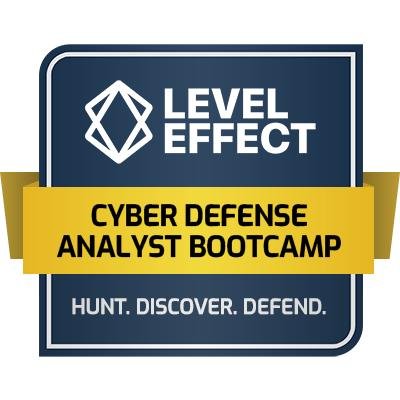How Learning Cybersecurity Changed My Brain
A year ago, I wondered if the left side of my brain was even trying.
In school, I was always drawn to the arts: writing, reading, language. I’ve always considered myself to be “right-brained,” meaning I’m more of a creative than a logical thinker. I’d never ventured over into the sciences because I just assumed they wouldn’t be my cup of tea.
Then, the opportunity to do some marketing work for Level Effect, a cybersecurity training company, came along. It changed me.
Let me explain.
Level Effect’s primary offering is a Cyber Defense Analyst Bootcamp: an intense, hands-on, 15-week program that teaches students the necessary skills to land a job as a cybersecurity analyst. It covers the ins and outs of some of the real-world concepts and situations cybersecurity analysts may face day to day, from networking challenges to knowing your way around the operating system…and the command line. 💀
When I was first learning about the bootcamp, I assumed I could market it just fine, as I’m a marketer and writer by trade. But then, the fellas at Level Effect offered me a once-in-a-lifetime opportunity: a free seat in the bootcamp to really understand what it was I was there to market.
Not intimidating at all to a right-brained creative, going to school four nights a week for four months. </sarcasm>
I took them up on their offer, not knowing what to expect. And there’s no way I could have predicted how the course and learning cybersecurity would change my brain.
Learning cybersecurity made me more analytical.
I didn’t even know I had it in me.
A prime example of my analytical side waking up after a horribly long sleep comes in the form of a blog post that I wrote for Huntress called Don’t Get Schooled: How to Catch a Phish. (Please, save your applause on that title til the end.)
I have enough common sense to have a general idea when I’m being phished or smished. But actually proving it one way or another was new to me until I sat down to write this blog.
I was able to recount a phishing attempt from someone claiming to be Amazon to tell me that my account had been suspended. I researched the sender using tools like Domain Dossier, ICANN, and urlscan.io. I was able to uncover a major red flag—a communication “from Amazon” that actually stemmed from a Tucow IP—and even traced the link without actually clicking it to see where it’d take me.
This was the first time I’d actually been able to analyze a phishing attempt and decide for myself whether the message was legitimate or not.
And that made me realize that I’d become more analytical.
Learning cybersecurity empowered me to feel comfortable amongst other cyber pros.
It just so happens that we had our yearly Summer Summit get-together at Huntress while I was still a student in the CDA Bootcamp.
One of the sessions during Summit consisted of an information session led by our incredible ThreatOps team. They covered some of the threats they’ve seen in the wild, diving right into the logs and pointing out the shady shenanigans they’ve seen.
Here’s the thing: I kept up with them during their entire presentation.
They used words I wouldn’t have understood a few months prior. They logged into the same systems I’d logged into to complete my coursework in the bootcamp. They recounted scenarios and threats similar to the very ones I’d triaged in the bootcamp.
For the first time, I was able to keep up with cybersecurity experts.
I was so excited that I couldn’t help but send a text to my instructors to tell them the news. This wasn’t me…but it was me, and I was so proud to see how much I’d learned and what I was capable of.
For a moment, imposter syndrome finally let go of its tight grip on me.
Learning cybersecurity showed me what I’m actually capable of.
If I’m honest with myself, I pursued English and communication in college because I was comfortable with those subjects.
Yes, I do enjoy those subjects, and I don’t regret choosing these concentrations as my majors in undergrad and grad school, respectively. But I’d be lying if I said I didn’t choose them because I thought my STEM options were nonexistent.
I’m a passionate advocate for women in STEM, but that never meant me. I just root for other women who are capable of using the left sides of their brain better than I am.
But learning cybersecurity made me change my way of thinking.
I really do feel like I could’ve excelled in a STEM major. Just typing that feels foreign to me, because I didn’t believe it a year ago. But if I, an English major, turned comms major, turned cyber bootcamp student could make that transition—and actually do well in an intense, hands-on cybersecurity bootcamp!!!—I know I can do anything I put my mind to.
And that feeling alone makes every sleepless night, every report written, every presentation given—worth it.


